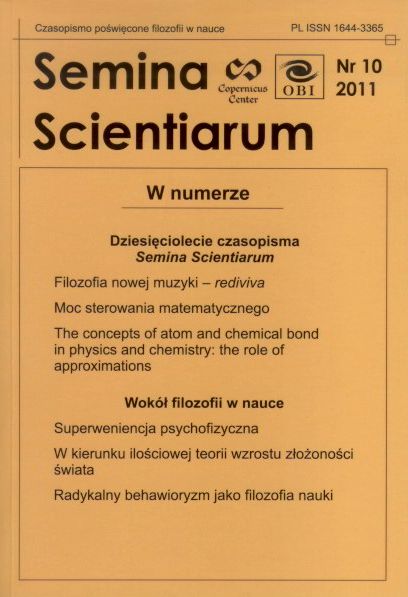Superweniencja psychofizyczna
DOI:
https://doi.org/10.15633/ss.1556Słowa kluczowe:
supervenience, mind-body problem, explanation, intentionality, Jaegwon Kim, causationAbstrakt
The aim of this article is two-fold. First, a critical presentation of the concept of supervenience is carried out. In this context, three basic types of supervenience are presented: weak, strong, and global. It is argued that the most useful types of supervenience are its strong, and global versions. Second, a broader analysis of the usefulness of supervenience is undertaken. It is argued that it is a very „flexible” concept, which allows for a variety of different solutions to the philosophical issue of the mind. However, the aforementioned flexibility can be limited by additional philosophical assumptions. Moreover, supervenience allows to augment traditional philosophical investigations concerning the mind with results of empirical findings of such sciences as psychology, or neuroscience. In this context it is argued that supervenience is a „third way” in the philosophical study of the mind.Bibliografia
T. Grimes, „Supervenience, Determination, Dependency”, Philosophical Studies, 62, (1991).
J. Kim, „Concepts of Supervenience”, [w:] tenże, Supervenience and Mind, Cambridge University Press, Cambridge 1993.
J. Kim, „Supervenience as a philosophical concept”, [w:] tenże, Supervenience and Mind, Cambridge University Press, Cambridge 1993.
D. Lewis, On the Plurality of Worlds, Oxford University Press, Oxford 1986.
J. MacNamara, Logika i psychologia, Wydawnictwo Naukowe PWN, Warszawa 1993.
Neural Correlates of Consciousness. Empirical and Conceptual Questions, T. Metzinger (red.), MIT Press, Cambridge 2000.
Pobrania
Opublikowane
Numer
Dział
Licencja
Twórca oświadcza, że przysługują mu prawa autorskie do utworu i że nie są ograniczone w zakresie objętym niniejszym oświadczeniem oraz że utwór jest dziełem oryginalnym i nie narusza praw autorskich innych osób.
Twórca zezwala Uniwersytetowi Papieskiemu Jana Pawła II w Krakowie na nieodpłatne, niewyłączne i nieograniczone w czasie korzystanie z utworu, to jest:
- utrwalanie i zwielokrotnianie: wytwarzanie egzemplarzy utworu techniką drukarską, reprograficzną, zapisu magnetycznego oraz techniką cyfrową;
- obrotu oryginałem albo egzemplarzami, na których utwór utrwalono (wprowadzanie do obrotu, użyczenie lub najem oryginału albo egzemplarzy, publiczne wystawienie, wyświetlenie, a także publiczne udostępnianie utworu w taki sposób, aby każdy mógł mieć do niego dostęp w miejscu i w czasie przez siebie wybranym);
- włączenie utworu w skład utworu zbiorowego;
- udzielanie przez Uniwersytet Papieski Jana Pawła II w Krakowie sublicencji Creative Commons Uznanie autorstwa-Użycie niekomercyjne-Bez utworów zależnych 3.0 Polska
Uniwersytet Papieski Jana Pawła II w Krakowie udostępnia utwór na Platformie Czasopism należącej do uczelni, na licencji Creative Commons Uznanie autorstwa-Użycie niekomercyjne-Bez utworów zależnych 3.0 Polska. Tym samym uprawnia wszystkich zainteresowanych do korzystania z utworu pod następującymi warunkami:
- zostanie podany autor i tytuł utworu,
- zostanie podane miejsce publikacji (tytuł czasopisma i adres internetowy do oryginalnie opublikowanego utworu),
- utwór będzie dystrybuowany w sposób niekomercyjny,
- nie będą tworzone utwory zależne.

